Blog / The Best Jurassic Park Sequel
- Date
- July 14, 2015
- Tags
Jurassic Park failed because Dennis Nedry was underpaid.
As a bidding contractor he shares the blame, but in the tech world we’d call him a bad hire. John Hammond says so himself through spoonfuls of ice cream in the Visitor’s Center. There are more specific lessons:
- Invest in a build server so compile jobs can’t be expected to take down the security cameras
- Use a source control system to track when your developers install backdoors
- Upgrade every workstation’s graphics cards so your 3D fly-though Unix systems scroll at a reasonable pace.
Jurassic World has more than one point of failure. I’m going to discuss them all now, in detail, so beware of spoilers for the entire movie.
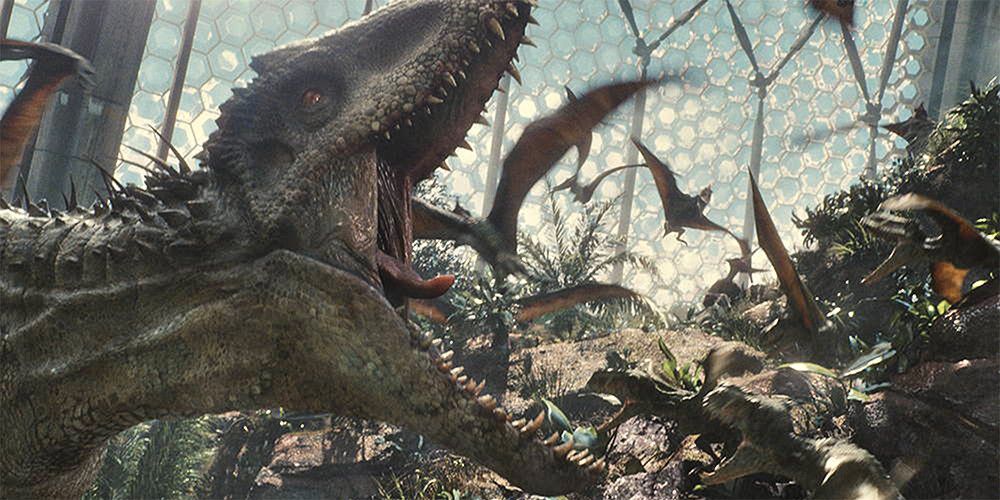
Its first problem is a common corporate woe: compartmentalization. Jurassic World’s geneticists were told to engineer something bigger, faster, with more teeth, but no one reported back on what they’d made. The ingredients of the Indominus Rex are doled out over the course of the movie for maximum dun-dun-DUN effect rather than something the park manager rattles off in her sleep. Knowing that this creature can hide its thermal signature, camouflage itself, and talk to Velociraptors would have saved a lot of lives.
Like the crew of the asset containment team sent to bring it back alive but killed in the park’s second failure: insufficient contingency planning. Twelve guys in body armor with giant tasers, stun guns, and nets go on foot to capture a Tyrannosaurus on steroids. They’re shredded effortlessly. Where are the helicopters? Armored trucks? Quadcopters that fire tranquilizer darts? Even those hamster balls would probably do well if you could fit a rifle on top. The park is so fixated on walls that it doesn’t have a good idea of what to do when a vicious carnivore scales one.
Or doesn’t. Jurassic World’s final failure is poor procedures. When the Indominus Rex scratches up the walls to make it look like she’s escaped, the first thing you should do is check the security cameras to see when that happened. Oh, you don’t want to do that. Okay, check the GPS beacon the size of a soda can you lodged in her neck. Surely that’ll tell you where… nope, don’t wanna do that either. What about looking around the cage where she would have landed for some dinosaur tracks? Just ask one of the employees outside if they see… huh. They’re playing Candy Crush and can’t be bothered? Well then, by all means climb into the domain of this mutated killing machine and touch the claw marks to make sure they’re not chalked on by an intern or something.
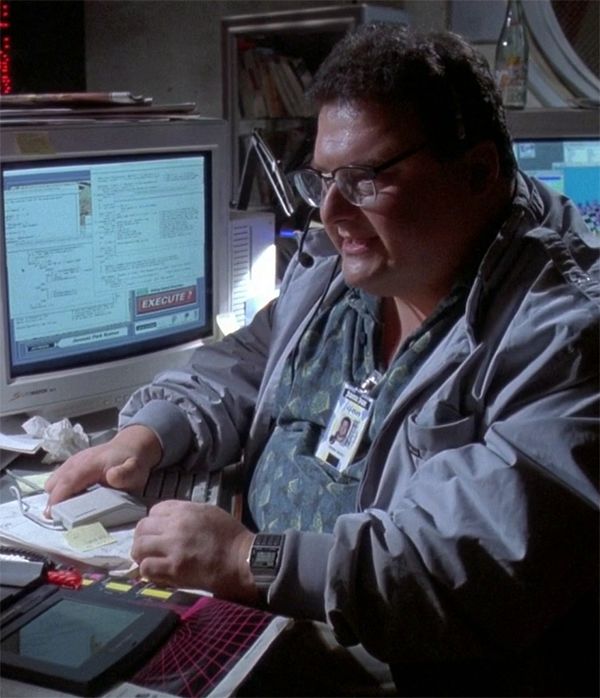
That’s the point when the park goes off the rails and I stop pretending I’m writing a postmortem for Raptor Fancy.
Consider the moment of no return in each movie. For Jurassic World it’s when Owen Grady is running away from the Indominus Rex and just makes it past the closing door but RAAAR!! the dinosaur breaks through and eats everyone. What’s the equivalent scene in Jurassic Park? When sweaty nerd Dennis Nedry clicks his computer mouse and a stopwatch at the same time.
The trophy for “Best Jurassic Park Sequel” is a booby prize.
Real prizes include the cinematography and direction for the new movie. We’re treated to spacious shots of the park and careful camera movement during action sequences. The Indominus Rex performs like a proper movie monster as it slowly bares its teeth to intimidate the juicy humans. 2015’s expensive CGI improves on the practical models, adding lots of personality to the frequent “dinosaur head moving next to something” shots. I loved the little details of the park: the multicultural announcements, the official staff buttons, the bored teenagers working the rides.
Speculating on the realities of Jurassic World is great fun. What’s insurance like when you exhibit extinct animals and genetic anomalies whose abilities are unknown even to their trainers? Do the staff live on the island? Owen seems to, given his lakeside bungalow. What’s the aviary normally like when all the flying dinosaurs who escape are trying to eat the humans? Is the island park considered a sovereign country or does it pay taxes to the United States or Costa Rica? Is there a special restaurant for high rollers who want to taste T-Rex meat? Someone who wants to spare no expense?
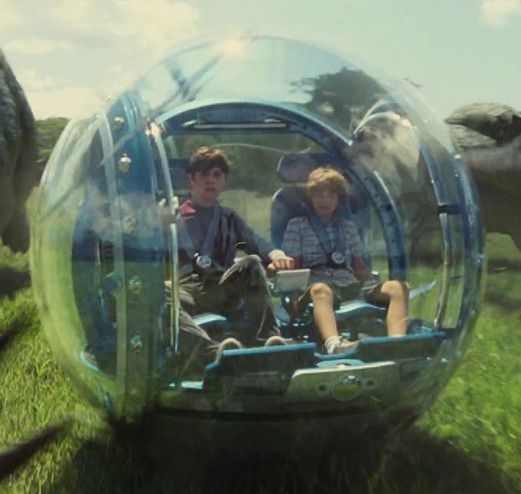
I wish we could spend the movie with that person.
Instead we’re shackled with two kids, one of which doesn’t want to be there, their babysitter who doesn’t want to be there, Claire Dearing the operations manager who doesn’t care enough about dinosaurs to want to be there, and Owen Grady the Velociraptor trainer who doesn’t want to be there because he’d rather be training the Velociraptors he insists are un-trainable. I can forgive the kids for being one-note, but not the adults.
Have you ever tried to play the Red Letter Media Character Generator? It’s simple: describe a character without saying what they look like or their role in the movie. This focuses attention on their personality. The more you can say, the better the character.
Let’s try Jurassic Park. Dennis Nedry is sweaty, nerdy, narcissistic, greedy, immoral, and slovenly. Can you visualize him nervously lying to John Hammond over a filthy desk? Alan Grant is cautious, bad with computers, hates kids, mischievous, and practical. Unfortunately Ellie Satler and Robert Muldoon don’t have much besides “tenacious” and “Australian” but they have a rapport and a quiet history with the other characters and the movie is better off with them.
Now try Jurassic World. How would you describe Chris Pratt’s character if you can’t talk about Velociraptors? Hint: being handsome doesn’t count. Bryce Dallas Howard goes from Not Really Caring About Her Nephews to Caring About Her Nephews A Little. What an arc! Also she ties her shirt around her waist this one time. Whoops, that’s an appearance descriptor!
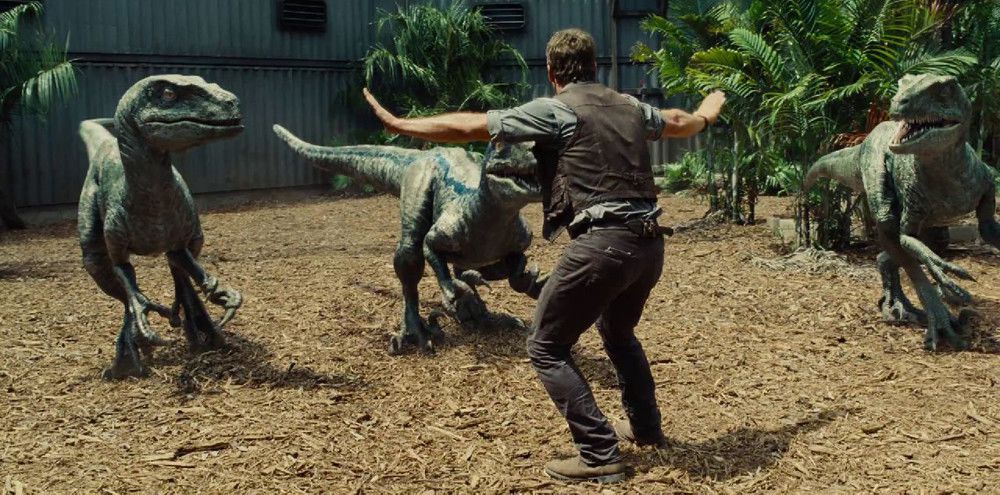
Put it another way: could you see yourself dressing up in Owen’s vest and slacks this Halloween? Claire’s all-white suit? If you did, would anybody recognize you? Would you quote any of their catchphrases? Do they even have a single line that couldn’t be given to someone else? I’d rather go as the evil Vincent D’onofrio and talk about how dropping “trained” Velociraptors into military operations is better than using experienced United States soldiers and drones. At least people will laugh.
Subtract the corporate negligence and the movie’s plot is satisfactory. Dinosaurs are put in cages, dinosaurs escape their cages, some people we don’t care about are eaten (also Katie McGrath’s character for the sin of being a slightly inattentive babysitter), with a big fight at the end that resolves the conflict between humans and dinosaurs. Since humans are as effective here as they are in Aliens vs. Predator, the dinosaurs eat each other.
That works, I suppose. It’s all the little stuff that shreds the movie to pieces.
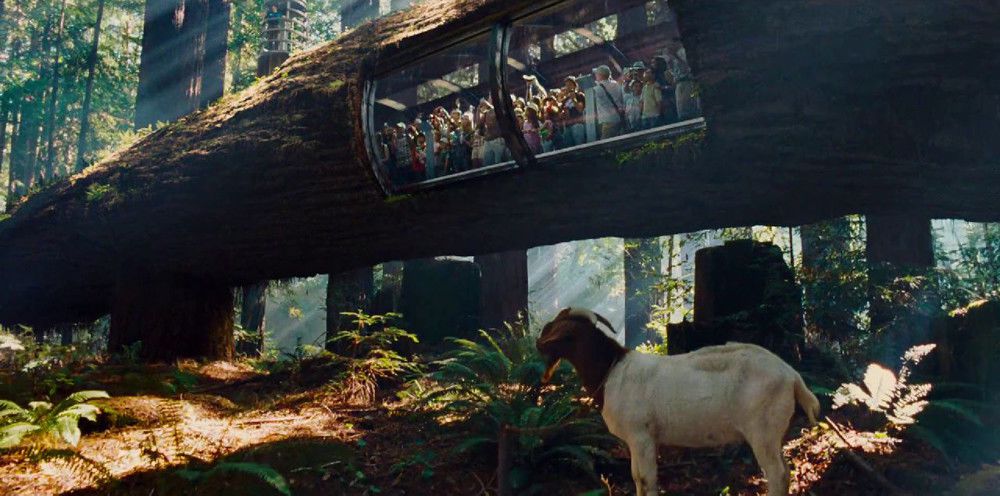
Like Jake Johnson’s character, AKA the guy in the control room with the Jurassic Park t-shirt, AKA the screenwriters couldn’t figure out how to have the movie deliver a sarcastic anti-corporate message organically so Jake’s just going to read aloud their statement of intent.
Or Vincent D’onofrio’s character, whose goal seriously is dropping trained dinosaurs into war zones. I guess it’s more original than robots or super soldier serums or biological warfare, but Chris Pratt’s Dino Team can barely understand “don’t eat me.” Vincent’s threats aren’t credible, he doesn’t menace effectively, and the bit where he takes over the park makes him seem like the voice of reason even if he is being a jerk. When he’s done being puppy-stompingly evil a Velociraptor just materializes and devours him.
In Jurassic Park the realists grumbled that a kid could survive being shocked by an electric fence. In Jurassic World electricity is used to save the kids by unrealistically reviving a twenty year-old jeep. Doesn’t gasoline go bad after sitting in a tank for just two years? Don’t tires deflate? And shouldn’t writers bring up “character has hidden talent X” more than five seconds before the character is called upon to do X?
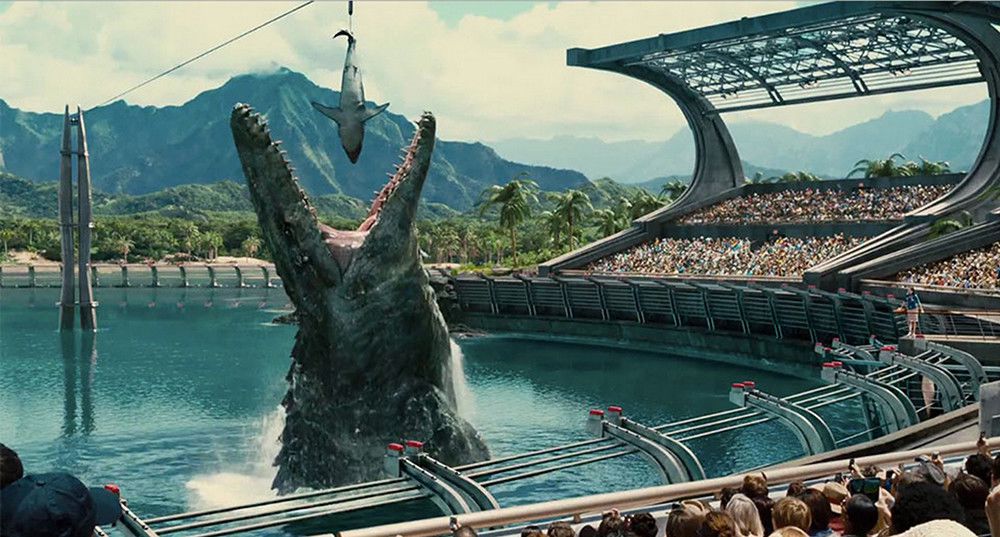
How do you end a Jurassic Park film? Hopefully with a close escape from closing jaws. That happens in Jurassic World, but there’s so many loose ends tickling your nose. What happens to the parents of those two kids? Does this trauma change their decision to divorce or is it unrelated? Do Owen and Claire hook up? They have no chemistry and nothing in common. B.D. Wong’s character has escaped with his plans for… whatever, after it’s revealed he was working for Vincent this whole time. Or was he just taking bribes to tweak the dinosaurs so they’re more lethal? The audience might feel more betrayed if we had a better idea what was going on.
Having a convoluted plot doesn’t make a movie better. Mad Max: Fury Road’s simple story made a huge emotional impact on its action. Don’t be concerned about whether or not you could write something complicated, stop and think if you should.
